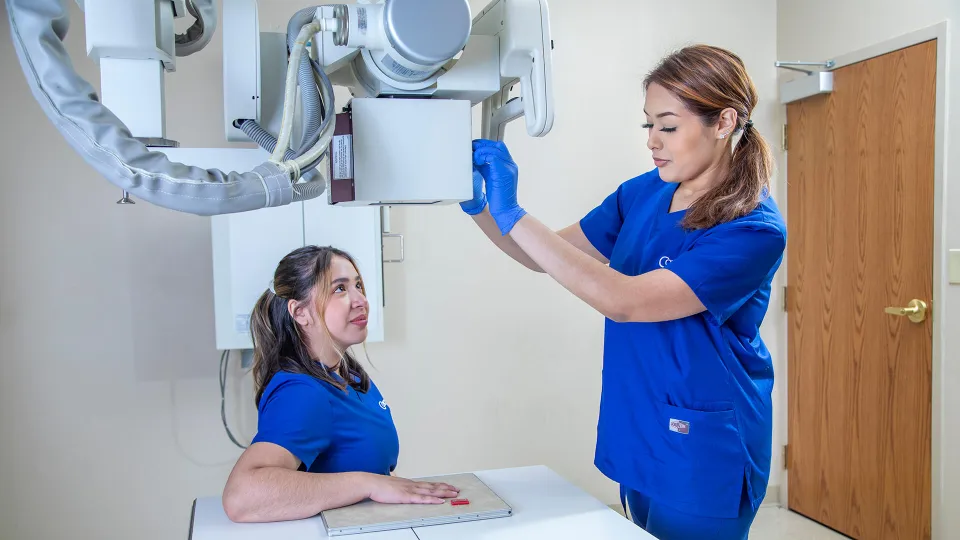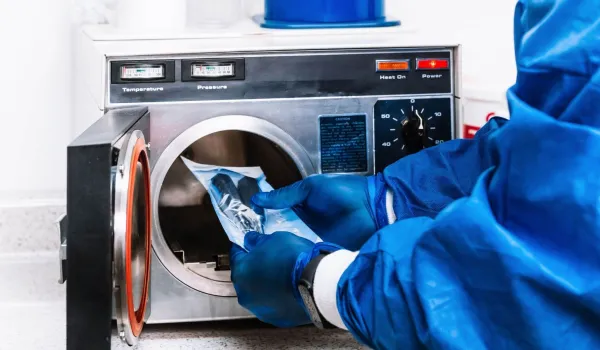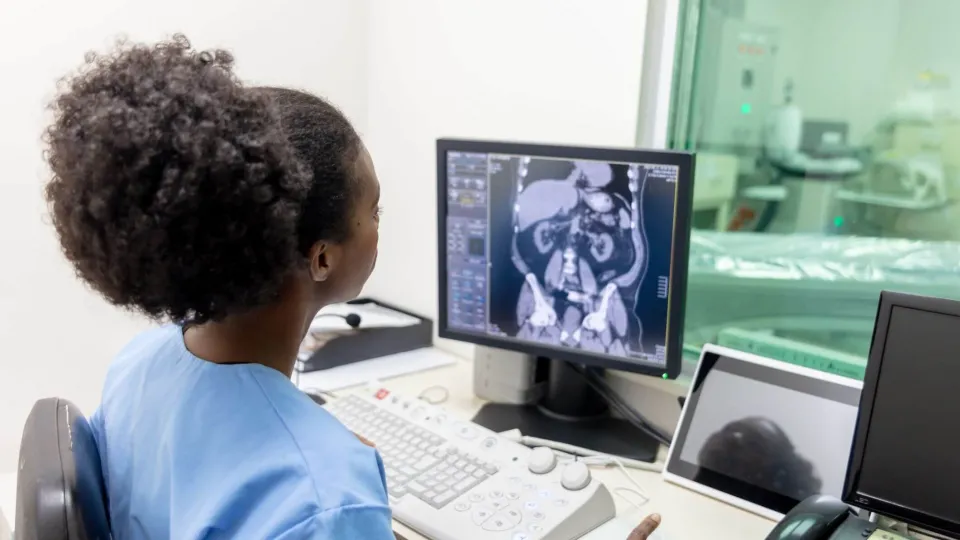
Radiologic technologists are healthcare professionals who use non-invasive imaging technology to capture diagnostic images of internal body structures. These technologists commonly use X-rays, magnetic resonance imaging, computed tomography, and ultrasound technology. You can position yourself for a career in this field with an associate degree in radiology. This degree program typically takes about two years to complete and includes classroom education and hands-on clinical training.
Career Opportunities

There are many career opportunities for graduates with an associate degree in radiology. This degree is expansive enough to include several imaging modalities so you can go on to specialize in testing focused on the areas that interest you most.
Radiologic Technologist/Radiographer
A radiologic technologist, also known as a radiographer or X-ray technician, guides the patient through their scheduled diagnostic imaging procedure. Their responsibilities include:
- Taking the patient's medical history
- Explaining the procedure to the patient
- Positioning the patient for the procedure
- Shielding exposed areas of the body that are not being imaged
- Adjusting and positioning the imaging equipment
- Capturing the images as ordered by the physician
- Maintaining all radiation protection and safety practices
- Evaluating the results to determine whether additional images need to be taken
- Maintaining detailed patient records of the procedure
Most new graduates with an Associate Degree in Radiologic Technology start their career working with X-rays. As you gain on-the-job experience, you may have the opportunity to branch out into other types of imaging technology such as MRI and CT scans. These opportunities are valuable, as you need to log a certain number of hands-on procedures in a specialty field before you can gain certification in that area.
Related: How To Become a Radiology Tech: Education, Certification and Career Path
Specialized Imaging Technologists
Specialized imaging technologists work in a specific area of imaging technology. For most students, this begins with the same radiography credential you need to work as a radiologic technologist. With a radiography credential from The American Registry of Radiologic Technologists, you will have the appropriate supporting category prerequisite to pursue specialized certification for:
- Mammography: Examines the breasts using X-ray imaging.
- Computed tomography: Focuses on CT scans that capture three-dimensional images.
- Magnetic resonance imaging: Uses a machine that captures images with a magnet and radio waves. MRI technologists may also inject patients with a contrasting dye that's visible on the scans.
- Bone densitometry: Measures bone loss with small-dose x-rays.
- Cardiac interventional radiography: Works with fluoroscopic equipment to capture images of the heart and surrounding blood vessels.
- Vascular interventional radiography: Assists physicians with image-guided vascular procedures using fluoroscopic equipment.
- Vascular sonography: Captures images of veins and arteries using sound waves.
- Breast sonography: Performs sonograms that follow up on abnormal mammography results.
To pursue any of the above credentials, you must have a radiography credential from ARRT and complete 16 additional hours of continuing education activities with at least one credit hour focused on each of the major content categories for your chosen specialty. You must accrue these hours within a period of 24 months. During this time, you also need to document a specified number of clinical experiences relevant to your discipline.
Related: Where Can You Work as a Radiology Tech?
Work Environments
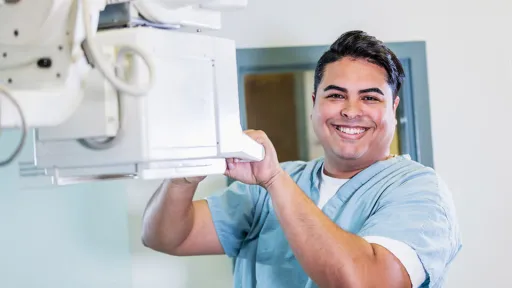
According to the Bureau of Labor Statistics, 60% of radiographers work in hospitals. Another 18% work in physicians' offices, and the remainder work in laboratories, outpatient care centers, or the federal government. Job distribution is similar for MRI technologists. Fifty-seven percent of MRI technologists work in hospitals while 18% work in laboratories, 13% work in physicians' offices, and just 3% work in outpatient care centers.
Radiographic technologists typically work full-time. In physicians' offices, they may keep regular weekday hours. However, those who work in hospitals are more likely to have varying schedules. In an emergency room or intensive care environment, patients may need diagnostic radiography at any hour, which means that some radiographers will work nights, weekends, and holidays.
Related: Day in the Life of a Radiologic Technologist | Helpful Traits for a Rad Tech
Certification and Licensure
Over 75% of states require some form of state licensure beyond an associate degree in radiology before you can work as a radiographer. Some of these states require ARRT certification to obtain appropriate licensing. While ARRT credentialing is often the first step toward qualifying to work in your state, you may need to meet other requirements as well.
Many states have ARRT administer their licensing exams. ARRT manages the exams and sends the results to the state. The state scores these exams and determines whether students pass or fail. ARRT's exams are similar, but ARRT determines whether students pass or fail these tests. Whether your state requires ARRT credentials or not, this credentialing is typically considered the gold standard of radiology certification and can improve your employment opportunities.
To sit for a state or ARRT licensing exam, you must complete an accredited Associate Degree in Radiologic Technology program. This will give you the opportunity to complete the education you need to pursue appropriate certification and registration tests and activities for licensing. Even where licensing isn't required, credentials from ARRT are highly respected and preferred by employers.
To maintain your ARRT certifications, you must report at least 24 credits worth of approved continuing education activities every two years. If you're an RT in sonography, at least 16 of these credits must be related to sonography. Approved CE hours include classroom learning, online classes, seminar lectures, and self-study readings.
Educational Programs
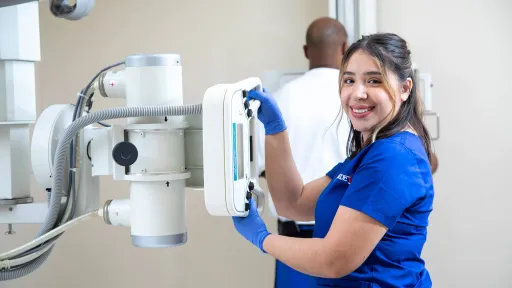
If you're not sure what specialty interests you, an Associate of Applied Science in Radiologic Technology is a well-rounded option. You can get an Associate Degree in Radiologic Technology from the Concorde Career College Aurora or Memphis campuses in as little as 20 months. The curriculum for the Associate Degree in Radiologic Technology covers topics such as:
- Medical terminology
- CPR
- Anatomy and physiology
- How to check vital signs
- Proper positioning for radiography procedures
- Radiation protection
- Processes for capturing radiographs
- Modifications to accommodate non-routine outcomes
- Critiquing images for diagnostic quality
- Oral and written communication skills
If you know that you want to specialize in a certain type of radiology, you can also choose a more focused program that provides a specialized Associate Degree in Radiologic Technology. Concorde offers two sonography training options that give you the opportunity to start on a focused career trajectory.
Related: How to Advance in Radiologic Technology
Cardiovascular Sonography
The 20-month Cardiovascular Sonography program gives students the opportunity to learn the skills they need to become an echocardiographer, also known as a cardiovascular ultrasound technologist or cardiac sonographer. Cardiac sonography uses ultrasound equipment to examine the heart, valves, and blood vessels.
Diagnostic Medical Sonography
The Diagnostic Medical Sonography Associate Degree program provides the opportunity to engage in the necessary training to become a diagnostic medical sonographer, also known as an ultrasound technologist. These diagnostic healthcare professionals use ultrasound on various parts of the body to capture internal images. This associate degree program can be completed in as little as 20 months.
Job Outlook
The job outlook is favorable for radiologic technologists and technicians. The Bureau of Labor Statistics projects a 6% growth in career opportunities for radiologic technologists and technicians. MRI technologists can anticipate even greater employment opportunities, with job growth projected at 8%. These numbers are higher than the national average of 4% growth anticipated for all occupations in the United States.
The reason for these opportunities is twofold. As the baby boomer generation ages, nearly all healthcare occupations are projected to see increased job opportunities. The increasingly large population of older adults will create a greater need for healthcare services, including diagnostic testing.
Radiologic imaging is useful for diagnosing broken bones and other injuries from falls. Each year, a quarter of the older adult population suffers from a fall. For 3 million of these individuals, that fall results in a visit to the emergency department, where the radiology department is likely to help diagnose the problem. Radiology is frequently used to diagnose and assess various cancers, which are also more common in the older population. Cancer risk is highest for those in their 80s.
The aging baby boomer generation is also retiring from their lifelong occupations. This means that many professionals are leaving the workforce and creating job opportunities for those who will step in behind them.
Get a Versatile Associate Degree in Radiologic Technology
An Associate Degree in Radiologic Technology can prepare you for numerous job opportunities in a faster-than-average growing healthcare career. Radiologic technologists play a key role in the healthcare system, providing the critical information that physicians need to diagnose and treat illnesses and injuries. If you're interested in technology, patient care, and the medical field, this career may offer the perfect fit. You can complete the Radiologic Technology Associate Degree Program at Concorde in as little as 20 months.
Bureau of Labor Statistics. “Radiologic and MRI Technologists: Work Environment.” https://www.bls.gov/ooh/healthcare/radiologic-technologists.htm#tab-3
Bureau of Labor Statistics. “Radiologic and MRI Technologists: Job Outlook” https://www.bls.gov/ooh/healthcare/radiologic-technologists.htm#tab-6
CDC. “Facts About Falls.” https://www.cdc.gov/falls/data-research/facts-stats/index.html
Cancer.org. “Special Section: Cancer in the Oldest Old.” https://www.cancer.org/content/dam/cancer-org/research/cancer-facts-and-statistics/annual-cancer-facts-and-figures/2019/cancer-facts-and-figures-special-section-cancer-in-the-oldest-old-2019.pdf
Take The Next Step Towards a Brighter Future
Interested in learning more about our Radiologic Technology program?
We have a Concorde representative ready to talk about what matters most to you. Get answers about start dates, curriculum, financial aid, scholarships and more!

